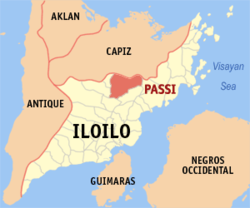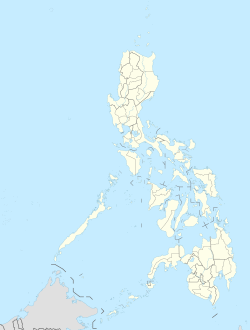Passi City
|
City of Passi Lungsod ng Passi Ciudad sang Passi |
||
| Location of Passi City in the province of Iloilo | ||
|---|---|---|

|
||
| Basic data | ||
| Region : | Western Visayas | |
| Province : | Iloilo | |
| Barangays : | 51 | |
| District: | 4. District of Iloilo | |
| PSGC : | 063035000 | |
| Income class : | 3rd income bracket | |
| Households : | 12,893 May 1, 2000 census
|
|
| Population : | 80,544 August 1, 2015 census
|
|
| Population density : | 320.7 inhabitants per km² | |
| Area : | 251.140 km² | |
| Coordinates : | 11 ° 6 ' N , 122 ° 39' E | |
| Postal code : | 5037 | |
| Area code : | +63 33 | |
| Website: | www.passicity.gov.ph | |
| Geographical location in the Philippines | ||
|
|
||
Passi (officially: City of Passi ; Filipino : Lungsod ng Passi ; Hiligaynon : Ciudad sang Passi ) is a city in the province of Iloilo on the Philippine island of Panay . The city is the largest city in the province by area with a land area of 251.140 km², which makes up about 5.39% of the total area of the province. It is located on the Jaluar and Lamunan rivers. The city is known as the center for the production of agricultural products in the region.
history
Passi City is one of the oldest Spanish settlements in the province. Founded in 1584, the municipality was named pueblo as early as 1766 and consisted of the villages: Buayahon , Alihid-on , Lab-on , Bato-bato , Bahi , Lupa and Nalpa . However, the place was settled by Malay migrants long before the arrival of the Spanish colonial rulers. The original inhabitants were called Tinguies de Passi because of the high number of Negritos and non-Christians in the place.
Culture
Kinaray-a is the most commonly spoken language. Hiligaynon , Tagalog, and English are also widely understood.
Every year, the Pintados de Pasi Festival is celebrated on March 14th in the city. Numerous body and animal paintings are carried out, as well as a beauty contest and dance performances. The city's patron saint is San Guillermo .
Special sights in the city are the old Church of St. William from the Baroque period, the Chameleon Butterfly Farm , the historic Mascuvado Chimney , the Amorotic Caves of Brgy. Magdungao and the vast pineapple plantations.
economy
Sugar cane , rice , pineapple and local textiles are the most important products of the Passi City economy.
politics
Passi City is politically divided into 51 barangays .
|
|
|
